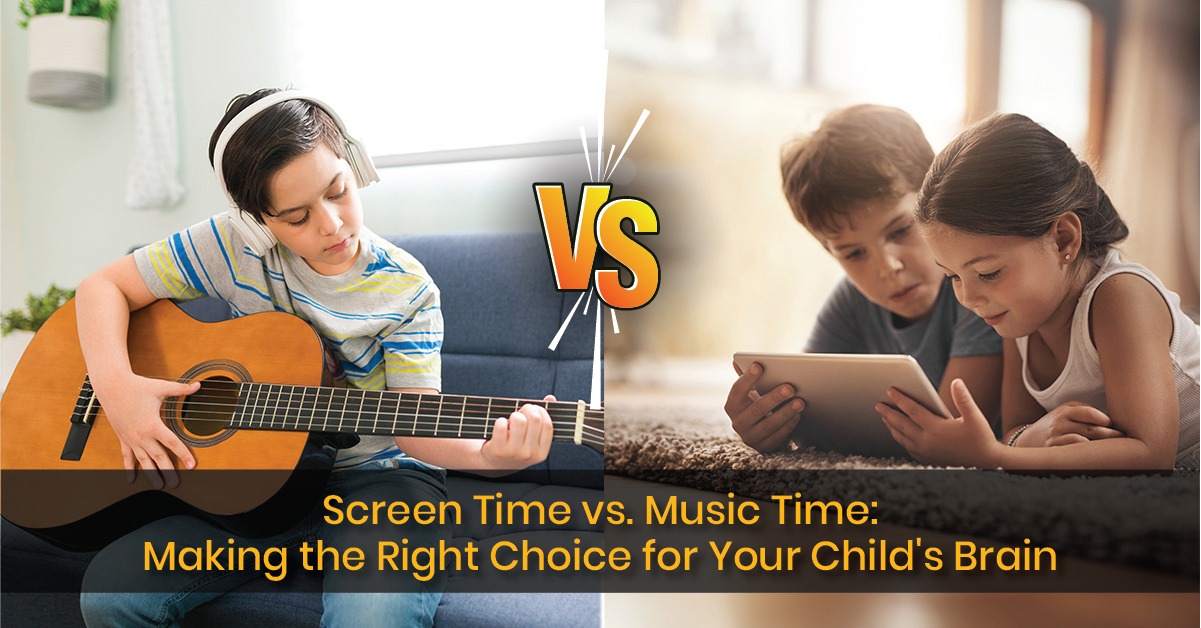
Screen Time vs. Music Time: Making the Right Choice for Your Child's Brain
In today’s digital world, screens are everywhere — phones, tablets, laptops, TVs. Whether it's online classes, video games, or cartoons, children are spending more time in front of screens than ever before. At the same time, more parents are beginning to ask: Is all this screen time affecting my child’s brain?
In today’s digital world, screens are everywhere — phones, tablets, laptops, TVs. Whether it's online classes, video games, or cartoons, children are spending more time in front of screens than ever before. At the same time, more parents are beginning to ask: Is all this screen time affecting my child’s brain?
The answer, backed by growing research, is yes. And not always in good ways.
But here's the good news: there's a healthy, brain-boosting alternative that not only balances screen use but also enriches your child’s development — music time.
In this blog, we’ll explore how screen time compares with music time, what it does to your child’s brain, and how engaging with music through training (such as at a top arts academy in Bhubaneswar) can lead to better mental, emotional, and cognitive outcomes.
What Exactly Is "Screen Time"?
Screen time refers to the amount of time spent using devices with screens like smartphones, tablets, computers, or televisions.
Not all screen time is harmful — educational programs, interactive learning apps, or virtual music classes can be positive. But the concern is excessive and passive screen time, such as:
Watching cartoons or YouTube for hours
Scrolling through social media
Playing high-stimulus video games
Mindless binge-watching
According to a report by the World Health Organization (WHO), children between 2–5 years should not have more than 1 hour of screen time per day. However, studies show many children far exceed this limit, especially post-pandemic.
The Effects of Excessive Screen Time on the Brain
Children’s brains are in a state of rapid development. Too much screen exposure during these formative years has been linked to:
❌ Reduced Attention Span
Fast-paced cartoons and constant screen-switching train the brain to expect quick rewards — leading to shorter attention spans and difficulty focusing on slower tasks like reading or problem-solving.
❌ Poor Sleep and Mood Swings
The blue light from screens interferes with melatonin production, disrupting sleep cycles. Inadequate sleep is closely linked with emotional instability, irritability, and learning difficulties.
❌ Delayed Language and Social Development
Children glued to screens often miss out on critical social interactions — conversations, facial cues, tone of voice — which are essential for language development and empathy.
❌ Sedentary Lifestyle and Health Risks
Extended screen time discourages physical activity, leading to obesity, posture problems, and even early signs of metabolic diseases.
So, what’s the antidote?
Music Time: A Brain-Boosting, Joy-Filled Alternative
Unlike passive screen time, music time is interactive, creative, and deeply beneficial for the growing brain. Whether it's playing an instrument, learning rhythm, or singing along to tunes — music lights up multiple areas of the brain simultaneously.
✅ Enhances Memory and Cognitive Skills
Music training improves working memory, concentration, and spatial-temporal reasoning — skills that directly benefit academic learning, especially in math and reading.
✅ Boosts Emotional Intelligence
Playing music helps children express emotions that they might struggle to verbalize. It also promotes patience, empathy, and emotional regulation.
✅ Encourages Social Interaction
Group lessons and performances encourage teamwork, listening, and cooperation — skills that are hard to learn through a screen.
✅ Develops Discipline and Focus
Learning music requires practice, repetition, and focus — helping kids build delayed gratification and perseverance, essential life skills.
✅ Promotes Physical Coordination
Instrumental music strengthens fine motor skills and hand-eye coordination — especially in instruments like piano, drums, or violin.
Why Formal Music Education Matters
While it’s great for kids to enjoy music casually, structured music learning takes the benefits to a whole new level. Training from a formal setup like a top arts academy in Bhubaneswar can offer:
Expert mentorship from trained musicians and educators
A well-rounded curriculum including theory, technique, and performance
Exposure to different genres — classical, contemporary, folk, etc.
Opportunities to perform, collaborate, and build confidence
Regular feedback and progress tracking
Such academies often blend music, performing arts, and creativity, helping children explore their interests while sharpening critical thinking and emotional resilience.
Striking the Right Balance
Let’s be realistic — we can’t (and shouldn’t) eliminate screen time completely. But we can manage it better and replace unproductive screen time with meaningful, brain-enhancing alternatives like music.
Try These Tips:
Set screen-time limits (use parental controls or timers).
Schedule regular music practice time each day.
Encourage your child to learn an instrument they’re curious about.
Replace YouTube videos with interactive music learning apps.
Enroll them in a local or online class at a reputable arts academy.
Turn family time into music time — sing together, play instruments, dance.
The Bhubaneswar Advantage: A Growing Hub for Arts Education
Cities like Bhubaneswar are witnessing a cultural renaissance. Known for its classical dance traditions, musical roots, and growing creative education scene, Bhubaneswar is home to many institutions that focus on both modern and traditional art forms.
Parents looking to nurture their child’s musical talent can explore options at a top arts academy in Bhubaneswar, where children not only learn music but also develop skills like performance, confidence, cultural appreciation, and discipline.
These academies often collaborate with experienced professionals and offer a blend of instrumental, vocal, and performing arts — opening multiple creative pathways for young learners.
Final Thoughts: Choosing Growth Over Convenience
Screens are convenient. They babysit. They distract. But they don’t nourish the brain the way music does.
Music is more than a hobby — it’s a tool for lifelong learning, emotional strength, and personal growth. When you replace an hour of passive screen time with music time, you’re investing in your child’s brain, body, and soul.
So the next time your child reaches for the tablet, consider this:
What if they picked up a flute instead?
What if they learned rhythm through drums?
What if they expressed emotion through song?
That’s not just a better choice. That’s a brilliant one.
The answer, backed by growing research, is yes. And not always in good ways.
But here's the good news: there's a healthy, brain-boosting alternative that not only balances screen use but also enriches your child’s development — music time.
In this blog, we’ll explore how screen time compares with music time, what it does to your child’s brain, and how engaging with music through training (such as at a top arts academy in Bhubaneswar) can lead to better mental, emotional, and cognitive outcomes.
What Exactly Is "Screen Time"?
Screen time refers to the amount of time spent using devices with screens like smartphones, tablets, computers, or televisions.
Not all screen time is harmful — educational programs, interactive learning apps, or virtual music classes can be positive. But the concern is excessive and passive screen time, such as:
Watching cartoons or YouTube for hours
Scrolling through social media
Playing high-stimulus video games
Mindless binge-watching
According to a report by the World Health Organization (WHO), children between 2–5 years should not have more than 1 hour of screen time per day. However, studies show many children far exceed this limit, especially post-pandemic.
The Effects of Excessive Screen Time on the Brain
Children’s brains are in a state of rapid development. Too much screen exposure during these formative years has been linked to:
❌ Reduced Attention Span
Fast-paced cartoons and constant screen-switching train the brain to expect quick rewards — leading to shorter attention spans and difficulty focusing on slower tasks like reading or problem-solving.
❌ Poor Sleep and Mood Swings
The blue light from screens interferes with melatonin production, disrupting sleep cycles. Inadequate sleep is closely linked with emotional instability, irritability, and learning difficulties.
❌ Delayed Language and Social Development
Children glued to screens often miss out on critical social interactions — conversations, facial cues, tone of voice — which are essential for language development and empathy.
❌ Sedentary Lifestyle and Health Risks
Extended screen time discourages physical activity, leading to obesity, posture problems, and even early signs of metabolic diseases.
So, what’s the antidote?
Music Time: A Brain-Boosting, Joy-Filled Alternative
Unlike passive screen time, music time is interactive, creative, and deeply beneficial for the growing brain. Whether it's playing an instrument, learning rhythm, or singing along to tunes — music lights up multiple areas of the brain simultaneously.
✅ Enhances Memory and Cognitive Skills
Music training improves working memory, concentration, and spatial-temporal reasoning — skills that directly benefit academic learning, especially in math and reading.
✅ Boosts Emotional Intelligence
Playing music helps children express emotions that they might struggle to verbalize. It also promotes patience, empathy, and emotional regulation.
✅ Encourages Social Interaction
Group lessons and performances encourage teamwork, listening, and cooperation — skills that are hard to learn through a screen.
✅ Develops Discipline and Focus
Learning music requires practice, repetition, and focus — helping kids build delayed gratification and perseverance, essential life skills.
✅ Promotes Physical Coordination
Instrumental music strengthens fine motor skills and hand-eye coordination — especially in instruments like piano, drums, or violin.
Why Formal Music Education Matters
While it’s great for kids to enjoy music casually, structured music learning takes the benefits to a whole new level. Training from a formal setup like a top arts academy in Bhubaneswar can offer:
Expert mentorship from trained musicians and educators
A well-rounded curriculum including theory, technique, and performance
Exposure to different genres — classical, contemporary, folk, etc.
Opportunities to perform, collaborate, and build confidence
Regular feedback and progress tracking
Such academies often blend music, performing arts, and creativity, helping children explore their interests while sharpening critical thinking and emotional resilience.
Striking the Right Balance
Let’s be realistic — we can’t (and shouldn’t) eliminate screen time completely. But we can manage it better and replace unproductive screen time with meaningful, brain-enhancing alternatives like music.
Try These Tips:
Set screen-time limits (use parental controls or timers).
Schedule regular music practice time each day.
Encourage your child to learn an instrument they’re curious about.
Replace YouTube videos with interactive music learning apps.
Enroll them in a local or online class at a reputable arts academy.
Turn family time into music time — sing together, play instruments, dance.
The Bhubaneswar Advantage: A Growing Hub for Arts Education
Cities like Bhubaneswar are witnessing a cultural renaissance. Known for its classical dance traditions, musical roots, and growing creative education scene, Bhubaneswar is home to many institutions that focus on both modern and traditional art forms.
Parents looking to nurture their child’s musical talent can explore options at a top arts academy in Bhubaneswar, where children not only learn music but also develop skills like performance, confidence, cultural appreciation, and discipline.
These academies often collaborate with experienced professionals and offer a blend of instrumental, vocal, and performing arts — opening multiple creative pathways for young learners.
Final Thoughts: Choosing Growth Over Convenience
Screens are convenient. They babysit. They distract. But they don’t nourish the brain the way music does.
Music is more than a hobby — it’s a tool for lifelong learning, emotional strength, and personal growth. When you replace an hour of passive screen time with music time, you’re investing in your child’s brain, body, and soul.
So the next time your child reaches for the tablet, consider this:
What if they picked up a flute instead?
What if they learned rhythm through drums?
What if they expressed emotion through song?
That’s not just a better choice. That’s a brilliant one.
